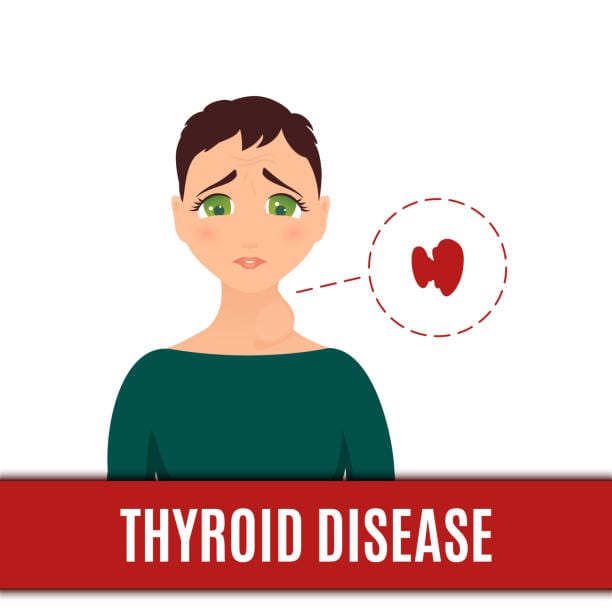Imagine waking up each day feeling like your body is in overdrive. You eat what seems like plenty, yet the scale keeps dropping. This hits hard for many with thyroid problems, where fast metabolism steals away hard-earned calories. If you’re searching for how to gain weight with thyroid problems, know that it’s tough but doable. Thyroid disorders like hyperthyroidism crank up your body’s engine, burning fuel at a wild pace and making weight gain feel impossible. In this guide, we’ll share safe steps to build weight steadily, from smart eating to gentle workouts.
First, let’s cover thyroid basics. This small gland in your neck makes hormones that control energy use, hunger signals, and how your body handles food. When it’s out of whack, it messes with appetite, drains your strength, and blocks nutrient grabs. We’ll walk through the science, doctor chats, meal ideas, moves to try, and ways to track wins. Stick around for tips that fit your life and help you reach those goals.
Understanding Thyroid Health Through Functional Medicine

Thyroid issues touch millions, and they often lead to surprise weight drops. Your body needs the right hormone balance to hold onto pounds. Without it, everyday tasks feel harder, and building size seems out of reach.
How the Thyroid Gland Influences Metabolism and Weight
The thyroid sits like a butterfly in your neck. It pumps out T3 and T4 hormones that set your metabolism’s speed. In hyperthyroidism, these hormones flood your system. This ramps up calorie burn, even at rest. You might eat a full plate but lose weight fast.
Overactive glands cause heat rushes, shaky hands, and quick pulse. These signs scream for a check-up. Track your heartbeat or tiredness in a notebook. Then, see a doctor for blood work. Early catch can slow the burn and open doors to gain weight with thyroid issues.
Doctors say this gland rules 60% of your daily energy spend. Balance it, and food sticks better. Think of it as tuning a car engine—not too hot, not too cold.
Common Thyroid Imbalances Affecting Body Weight
Hyperthyroidism tops the list for shedding pounds. Graves’ disease, an immune mix-up, sparks most cases. It makes the gland overwork, torching fat and muscle. About 1 in 1,000 folks face this each year, per health reports.
Hypothyroidism does the opposite—it packs on weight from slow burn. But we’re focusing on the loss side here. Other culprits include toxic nodules that leak extra hormones. Symptoms like sweat and nerves often tag along.
Get TSH tests early. Low levels flag overdrive. Blood checks cost little and spot trouble quickly. Talk to your doc about family history too. It runs in lines sometimes.
Challenges in Weight Management with Thyroid Imbalances

Fast metabolism eats calories like fire on dry wood. Your body breaks down food quicker, leaving little for storage. Muscle shrinks too, as the gland pulls protein for energy. Appetite dips from gut speed-up or nausea.
Treatments add twists. Drugs like antithyroid meds calm the storm but might swing weight the other way at first. Nutrient pull suffers—vitamins slip through uncaught. This cycle frustrates many trying to bulk up.
Log your daily burn with a simple app. Note meals and energy dips. This baselines your fight. Adjust as you learn your body’s tricks. Patience pays off here.
Consulting Healthcare Professionals Before Starting
Jumping into changes alone risks bumps. Thyroid care needs expert eyes. Pros guide you past pitfalls like med clashes or hidden lacks.
Doctors stress teamwork. Your plan should match tests and goals. This builds trust and speeds real wins.
Finding a Functional Medicine Specialist for Thyroid Health
Start with an endocrinologist—they know glands inside out. Skip the family doc for deep dives. These pros order scans like ultrasounds to peek at your thyroid.
Book that first visit soon. Bring notes on weight slips and moods. Ask, “How does my treatment tie to gaining pounds?” They might run full hormone panels. Expect chats on diet and meds.
Lists from health sites help find one near you. Check reviews for patient stories. A good fit makes the road smoother.

Balancing Thyroid Treatment with Weight Gain Goals
Meds such as methimazole dial down hormone floods. Once levels are steady, your body holds calories better. But watch for tummy upset that kills hunger.
Timing matters. Take pills away from meals to avoid blocks. Docs tweak doses based on blood draws. This creates space for extra eats.
Plan talks every four to six weeks. Share weight logs. They adjust to fit your gain path. It’s a team effort, not solo.
Monitoring Progress and Adjusting Plans
Weigh weekly, not daily—scales lie with water shifts. Track energy and TSH numbers too. Apps like MyFitnessPal share data with your team.
Hormones take time to settle, so give it months. Note mood lifts or steady pounds. If off track, tweak with pro input.
Use shared logs for easy reviews. This spots patterns fast. Stay patient; small steps add up.
Nutrition Strategies for Weight Gain with Thyroid Issues
Food fuels the fight. Pick dense bites that feed the gland without overload. Thyroid-friendly high-calorie meals build surplus smartly.
Aim for balance. Nuts, fats, and proteins shine here. They pack punch without gut woes.
Building a Calorie-Surplus Diet Tailored to Thyroid Health
Add 250 to 500 calories over your needs each day. Use whole picks like avocados or olive oil drizzles. Fatty fish brings omega-3s to calm inflammation and aid hormones.
Try TDEE tools online, tweak for thyroid speed. A sample day: oats with nuts for breakfast, salmon salad lunch, nut butter snacks. This surplus sticks when metabolism eases.
Portions grow slow. One extra handful beats force-feeding. Your body thanks the steady flow.
Nutrient-Rich Foods to Boost Appetite and Absorption
Selenium from Brazil nuts mends thyroid paths. Just two a day covers needs. Zinc in seeds and lean meats fights fatigue.
Blend smoothies with banana, yogurt, and almond butter. Quick and calorie-loaded. For low hunger, split into five to six small feeds
Ginger tea aids digestion, pulling more from each bite. Veggies like spinach add iron without bulk. These choices support gain with thyroid problems naturally.
Supplements and Dietary Adjustments to Consider
Check for leaks first—vitamin D or B12 run low in many. Docs green-light fills if tests show gaps. Skip extra iodine; it might rev the gland.
Pair eats with probiotics for better gut hold. Yogurt or kefir works. If nausea hits, sip broths with fats.
Talk supps with your team. They fit your med mix. Simple tweaks like herbal teas ease paths.
Exercise and Lifestyle Modifications for Optimal Thyroid Function
Moves matter, but pick wise. Strength builds mass to trap calories. Rest seals the deal.
Lifestyle ties it. Sleep and calm keep hormones even. This duo turns efforts to results.
Strength Training to Build Muscle Mass Safely
Lift weights three to four days a week. Start light—bodyweight squats or dumbbell rows. Aim eight to twelve reps per set.
Compound lifts like deadlifts hit big groups. They spark post-burn hunger. Rest days prevent burnout, key with thyroid drain.
Hire a trainer if new. They spot form flaws. Muscle adds pounds that stay.
Incorporating Rest and Recovery Practices
Sleep seven to nine hours nightly. It resets hormones and stores fuel. Poor rest spikes stress that melts fat.
Yoga or walks cut cortisol. Deep breaths calm the overdrive. Track with a band—aim for deep cycles.
Nap if needed, but keep routines. Recovery fuels tomorrow’s gains.
Daily Habits to Support Metabolic Stability
Time meals post-meds for best pull. Drink water steadily—dehydration fakes loss. Evening bites like cheese and fruit lock in calories overnight.
Walk after eating to settle without burning. Sun time boosts vitamin D for thyroid aid. Small habits stack big.
Journal routines. Adjust what works. Stability breeds success.
Tracking Progress and Adjusting Your Functional Health Plan
Wins hide without a watch. Set marks and eye hurdles. This keeps you on path.
Real talk: bumps happen. But tools turn them into lessons.
Setting Realistic Goals and Measuring Success
Target half to one pound a week. Scales miss muscle, so measure waist or arms. Photos weekly show shifts.
Log moods and strength too. Gains beyond weight count. Celebrate small things—like fitting old jeans looser.
Apps remind check-ins. Stay true to pace.
Dealing with Plateaus and Side Effects
If stuck, up calories by 200. Post-treatment shifts need tweaks. Nausea? Go for bland fats like rice with butter
Wait two weeks, then call a diet pro. They spot diet holes. Side effects fade with time and tips.
Push through with variety. New recipes spark interest.
Long-Term Maintenance for Sustained Weight Gain
Check thyroid yearly. Life changes, so plans do. Forums link you to others—share wins.
Weave habits daily. Family meals build bonds and bites. Consistency wins races.
Revisit goals quarterly. Adapt and thrive.
Conclusion
Gaining weight with thyroid problems starts with doc talks, smart eats, strength work, and steady tracks. Manage the gland first, then layer in surplus calories from nuts and fish. Build muscle to hold it, rest to recover, and log to adjust. Sustainable change comes patiently and planned.
Key takeaways:
- See pros before changes—get thyroid tuned right.
- Choose calorie-dense whole foods like avocados and seeds for thyroid support.
- Do strength training three times a week to add lasting mass.
- Track weekly and tweak; patience turns struggles to success.
Ready to start? Chat with your doctor today and pick one tip to try. Share your story in the comments—we’re in this together.
Stay updated with the latest information on functional medicine
Also Read: Thyroid Supplements: The Essential Role of Selenium, Iodine and Zinc in Thyroid Health
Please subscribe to our social channels for updates related to functional medicines.
Instagram: thehormonereset
Facebook: Hormone Reset
YouTube: Hormone Reset Program
LinkedIn: Hormone Reset
FAQ’s
- Can you gain weight if you have thyroid problems?
- Yes, with proper treatment, calorie-dense foods, and strength training, weight gain is possible even with thyroid issues.
- Why is it hard to gain weight with thyroid disorders?
- An overactive thyroid speeds metabolism, burning calories too quickly and making it harder to store weight.
- What foods help gain weight with thyroid problems?
- Nuts, avocados, fatty fish, seeds, and smoothies provide nutrient-rich calories that support healthy weight gain.
- Should I see a doctor before trying to gain weight with thyroid issues?
- Yes, consult a hormone reset expert to balance thyroid levels before starting any weight gain plan.
- Does exercise help in gaining weight with thyroid problems?
- Yes, strength training builds muscle mass, helping your body hold on to calories and gain healthy weight.
- How many calories should I add to gain weight with thyroid issues?
- Adding 250–500 calories per day above your needs helps steady and safe weight gain.
- Can supplements help with thyroid-related weight loss?
- Yes, under medical guidance, supplements like vitamin D, B12, and selenium can support thyroid and weight health.
- How long does it take to gain weight with thyroid treatment?
- It may take a few months, as thyroid balance and consistent nutrition are key to lasting results.
- What lifestyle habits support weight gain with thyroid disorders?
- Adequate sleep, stress reduction, and regular meals boost metabolic stability and support healthy weight gain.
- Can Hormone Reset programs help with thyroid weight issues?
- Yes, Hormone Reset offers functional medicine strategies to balance thyroid health and support sustainable weight gain.



